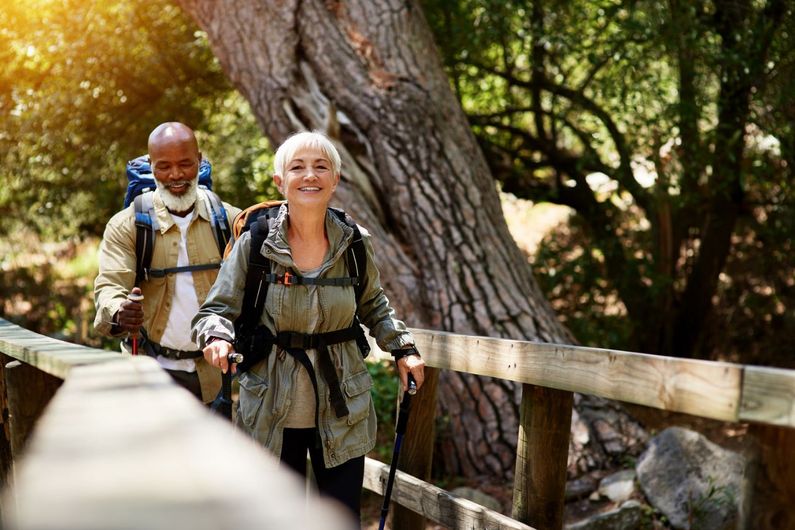Seniors: move, stimulate your neurons, socialize!
- UdeMNouvelles
11/22/2023
- Martin LaSalle
Following a program of physical exercise combined with cognitive training can greatly help older people with mild cognitive impairment, a national study finds.
Symptoms of mild cognitive impairment in the elderly can be slowed or even reversed if they follow a combined program of physical exercise and cognitive training, according to the results of a clinical study of 175 seniors diagnosed with the disorder.
Published in July in JAMA Network Open, the study was done by researchers at five Canadian universities led by Dr. Louis Bherer, a medical professor at Université de Montréal and director of the EPIC Centre at the Montreal Heart Institute.
Several previous studies have measured the benefits of exercise, cognitive training and the taking of vitamin D supplements on the mental health of elderly people, but none had compared combinations of the three, with control groups for each.
The team of researchers at UdeM, Western University, University of Waterloo, Wilfrid Laurier University and University of British Columbia filled this gap by comparing the effectiveness of the three interventions in five combinations:
- exercise, cognitive training and vitamin D;
- exercise, cognitive training and vitamin D placebo;
- exercise, sham cognitive training, and vitamin D;
- exercise, sham cognitive training and vitamin D placebo;
- stretching exercises, sham cognitive training and vitamin D placebo.
Ranging in age from 60 to 85 and recruited between 2016 and 2020, the study's 175 participants all had mild cognitive impairment, a condition that a high risk of eventually developing into dementia.
They were assessed on four criteria: “People with this condition have subjective and objective loss of memory or attention—or both—but are able to perform daily tasks and don’t have dementia,” Bherer explained.
In the general population, the risk of being diagnosed with dementia is 8 per cent after age 65. In people with mild cognitive impairment, the risk is 50 per cent.
An even bigger difference
The results confirm that while physical activity contributes to cognitive health, adding games or tasks that stimulate the neurons makes an even bigger difference.
So what type of physical and cognitive effort will produce real improvements in cognitive function in people once they enter their 60s?
“You want a level of aerobic exercise that warms you up—a brisk walk, cycling or swimming, for example—and adding strength training will give even better results,” Bherer said.
He recommends exercising at least three, if not four, times a week.
“Aerobic and muscular exercises release proteins that have a neurotrophic effect on brain cells,” he explained.
For cognitive stimulation, Bherer recommends almost daily practice.
“You have to try to learn new things and stimulate rapid decision-making—for example, with games that require a response to two stimuli at the same time, and that also give feedback to encourage you to push your limits,” he said.
“It’s also good to have social interactions at least twice a week, ideally getting out of the house to get some stimulation. The important thing is to find activities you enjoy, and to vary them from time to time, so that you keep up both the physical and cognitive activities.”
Four months of activities
Followed for 20 consecutive weeks, the participants performed a number of aerobic and strength exercises, at an intensity high enough to increase their heart rate and give them shortness of breath.
For their cognitive training, they performed decision-making tasks that required speed of execution and divided attention. They did the tasks on a computer tablet using a special app developed in Bherer’s lab.
Finally, they supplemented their diet with 10,000 IU (international units) of vitamin D, three times a week.
To measure changes in participants’ cognitive abilities, the researchers used the Alzheimer's Disease Assessment Scale-Cognitive Subscale (ADAS-Cog) 13 test, which scores such aspects as memory, orientation, comprehension and language use.
A higher overall score indicates greater cognitive decline, and vice versa.
Physical exercise combined with cognitive training produced the best results. In this group, cognitive abilities showed improvement at the end of the 20-week program and improvements were still seen six months later.
“The results were not only statistically significant but also clinically meaningful: episodic memory, attention span and sense of orientation really improved,” Bherer said.
Exercise by itself also yielded improvements, but to a lesser extent.
By contrast, the control group showed cognitive decline after the 20-week program.
Although previous studies suggest it may help, vitamin D supplements had no effect on cognition, possibly "due to normal-to-high serum levels in our participants," Behrer said, "vitamin D supplementation being beneficial only in cases of severe deficiency."















